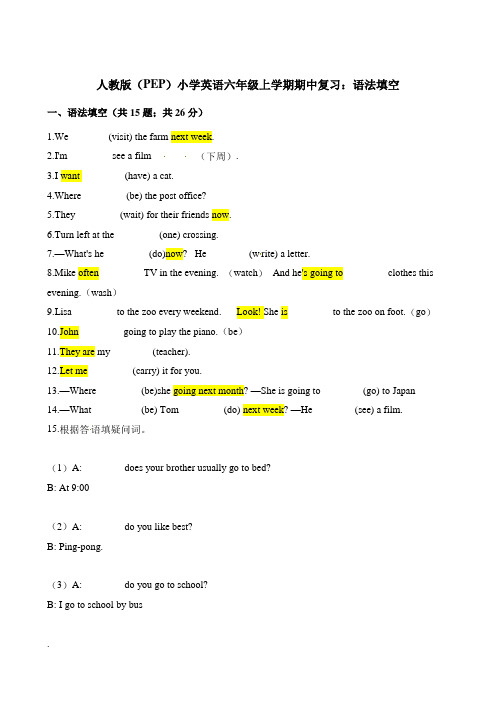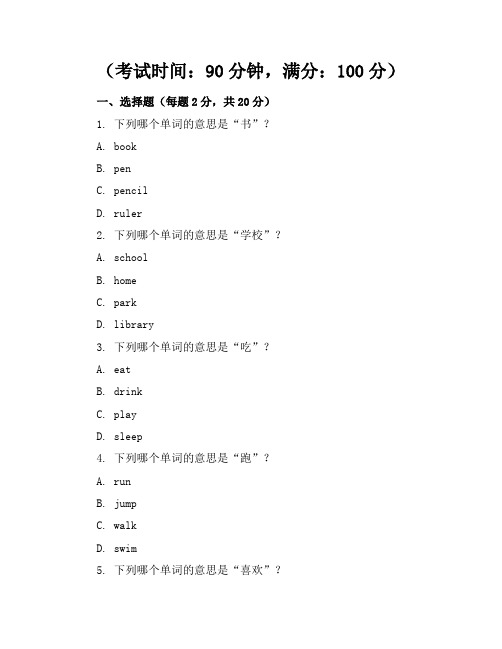最新人教版小学六年级上册英语(语法填空练习试题三)含答案
六年级上册英语试题-期中复习:语法填空 人教(pep)(含解析)

人教版(PEP)小学英语六年级上学期期中复习:语法填空一、语法填空(共15题;共26分)1.We________(visit) the farm next week.2.I'm ________ see a film ________(下周).3.I want ________ (have) a cat.4.Where ________ (be) the post office?5.They ________ (wait) for their friends now.6.Turn left at the ________ (one) crossing.7.—What's he ________ (do)now? He ________(w rite) a letter.8.Mike often ________ TV in the evening. (watch)And he's going to ________ clothes this evening.(wash)9.Lisa ________ to the zoo every weekend. Look! She is ________ to the zoo on foot.(go)10.John ________ going to play the piano.(be)11.They are my________ (teacher).12.Let me ________ (carry) it for you.13.—Where ________ (be)she going next month? —She is going to ________(go) to Japan14.—What ________ (be) Tom ________ (do) next week? —He ________(see) a film.15.根据答语填疑问词。
小学六年级英语填空题练习附答案

小学六年级英语填空题练习附答案语法填空练习题是难度最高的英语题目,没有之一。
面对这个题型,大家最好多点练习总结经验,小编整理了小学六年级英语填空题练习附答案内容,希望能帮助到您。
小学六年级英语填空题练习附答案Passage 1Mr Hu __1___ us English this term. He is nice . He __2___ wearing a white shirt and black trousers. He __3___ very good English . He often __4___ with us. We all like him very much.Mr Hu __5___ two little sons. They’re twin brothers. They are only five. They often __6___ the same clothes. __7___ Betty goes to Mr Hu’s home. She loves to __8___ the twins and play with __9___ . Mr Hu __10___ his sons, Bao Bao and Bei Bei.1. ( )A. tellsB. teachesC. speaksD. works2. ( )A. isB. likesC. wantD. does3. ( )A. speaksB. saysC. tellsD. teaches4. ( )B. speaksC. talksD. tells5. ( )A. wantsB. hasC. looks afterD. teaches6. ( )A. wearB. put onC. haveD. in7. ( )A. ButB. AndC. ThenD. Sometimes8. ( )A. lookB. thinkC. takeD. see9. ( )A. twinsB. onesC. theyD. them10 ( )B. nameC. thinksD. think答案与解析Passage 11. B 句型teach sb sth意为“教某人……”2. A 此空填is补全现在进行时结构:主语+be+动词ing的形式。
新课标人教版小学英语六年级上册模拟试卷含参考答案

(考试时间:90分钟,满分:100分)一、选择题(每题2分,共20分)1. 下列哪个单词的意思是“书”?A. bookB. penC. pencilD. ruler2. 下列哪个单词的意思是“学校”?A. schoolB. homeC. parkD. library3. 下列哪个单词的意思是“吃”?A. eatB. drinkC. playD. sleep4. 下列哪个单词的意思是“跑”?A. runB. jumpC. walkD. swim5. 下列哪个单词的意思是“喜欢”?A. likeB. loveC. hateD. don't like6. 下列哪个单词的意思是“红色”?A. redB. blueC. yellowD. green7. 下列哪个单词的意思是“苹果”?A. bananaB. appleC. orangeD. watermelon二、填空题(每空1分,共20分)1. I _______ a banana.2. The apple is _______.3. I _______ the book.4. The school is _______.5. I _______ to school every day.三、判断题(每题2分,共20分)1. The banana is yellow.()2. I love apples.()3. The book is on the desk.()4. I go to school bus.()5. I like to play football.()四、简答题(每题5分,共25分)1. 请用英语描述一下你的家。
2. 请用英语描述一下你的学校。
3. 请用英语描述一下你的朋友。
4. 请用英语描述一下你的爱好。
5. 请用英语描述一下你的梦想。
五、综合题(每题10分,共25分)1. 请用英语写一篇关于你的家庭的文章。
2. 请用英语写一篇关于你的学校的文章。
六年级英语上册语法填空题专项完整人教PEP版

六年级英语上册语法填空题专项完整人教PEP版班级:_____________ 姓名:_____________1. 根据句意,首字母或所给词提示填入所缺单词。
[1]Kitty s________ in front of a magic machine and takes a photo.[2]She is________ the bus.[3]—When is ________ ________?— It''s on June 1st.[4]Go straight, then________(转向) left.[5]Gogo can ________ (write). Look, he is ________ (write).[6]I ________(take) it a long time ago.[7]Are the park keepers________(friend) in your area?2. 按要求写词。
[1]story(复数)____________[2]wear(现在分词)____________[3]play(第三人称单数形式)____________[4]let’s(完整形式)____________[5]do(第三人称单数形式)____________[6]go(现在分词)____________[7]minute(复数)____________[8]late(反义词)____________[9]begin(第三人称单数形式)____________[10]drink(复数)____________3. 用所给单词的适当形式填空。
[1]I__________ (visit) my grandparents last Sunday.[2]I’m going to__________ (fly) a kite with my little sister this afternoon. [3]Bill __________ (go) to a hockey club twice a week.[4]Tom often__________ (clean) the window at home.[5]Let’s __________ (water) the plants. It’s too dry outside.4. 按要求写单词。
考题六年级英语上册语法填空专项

考题六年级英语上册语法填空专项班级:_____________ 姓名:_____________1. 根据括号中所给的汉语意思写单词,补全句子。
[1]Where are my ________(眼镜)?[2]Please show us how to clean the ________(地板).[3]My sister is going to Shanghai next ________(星期六).[4]How many ________(猴子)does the zoo have?[5]I like that ________(蓝色的)dress.2. 用括号内单词的正确形式填空。
[1]The sun is shining and the wind is_______. ( blow , blowing ).[2]The birds are ______away. (fly , flying)[3]The ducks are _________ on the pond . (swim , swimming)[4]The cows are _______water. (drink , drinking)3. 用所给词的适当形式填空。
[1]I ______(watch )''TV last Sunday.[2]My mother _______(read)a book last night.[3]Amy _______(visit) her grandparents last week.[4]Did you _______(play) football yesterday?[5]I usually _______(wash) the clothes on Sundays.4. 用所给词的正确形式填空。
[1]Her father _____________ (drive) to work yesterday.[2]The little girl _____________ (cry) in the room now.[3]I _____________ (drink) tea with my mother at home yesterday afternoon. [4]His grandpa _____________ (buy) a bike tomorrow.[5]My brother _____________ (has) a cold yesterday.5. 用下列单词的适当形式补全句子。
六年级英语语法填空完形填空题30题答案解析版

六年级英语语法填空完形填空题30题答案解析版1My school is a very beautiful place. There are many tall trees and colorful flowers in the schoolyard. The classrooms are clean and bright. The teachers are kind and helpful. The students are friendly and active. We have a large library with lots of interesting books. We also have a big playground where we can play different sports.1. My school is a very ___ place.A. uglyB. beautifulC. smallD. dirty答案:B。
学校有很多高树和五颜六色的花,教室干净明亮,老师善良且乐于助人,学生友好又活跃,还有大图书馆和大操场,可推断学校是美丽的。
A 选项ugly( 丑的)不符合;C 选项small( 小的)与文中描述不符;D 选项dirty 脏的)也不符合。
这里考查形容词的运用。
2. The classrooms are ___ and bright.A. darkB. oldC. cleanD. noisy答案:C。
根据文中描述“classrooms are clean and bright”可知选clean。
A 选项dark( 暗的)不符合;B 选项old( 旧的)文中未提及;D 选项noisy 吵闹的)也不符合。
考查形容词用法。
3. The teachers are kind and ___.A. strictB. lazyC. meanD. helpful答案:D。
2023-2024学年全国小学六年级上英语人教版期末考卷(含答案解析)

一、选择题(每题2分,共30分)1. Which of the following words is NOT a noun?A. AppleB. HappyC. DogD. Tree2. Choose the correct form of be in the blank.A. I _______ a student.B. You _______ my friend.C. He _______ at school.D. They _______ happy.3. What is the past tense of the verb "do"?A. DidB. DoneC. DoesD. Doing4. Which word means "not correct"?A. RightB. WrongC. GoodD. Bad5. What is the opposite of "big"?A. SmallB. LargeC. TallD. ShortA. WhoB. WhatC. WhereD. Why7. What is the singular form of "feet"?A. FootB. FeetC. FootsD. Feets二、判断题(每题1分,共20分)1. Apples are a type of fruit. (T/F)2. The sun is a planet. (T/F)3. A cat has four legs. (T/F)4. The sky is yellow. (T/F)5. A bicycle has three wheels. (T/F)6. A triangle has four sides. (T/F)7. Birds can fly. (T/F)8. The moon is closer to the Earth than the sun. (T/F)9. A fish lives in water. (T/F)10. The letter "A" is the first letter of the alphabet. (T/F)三、填空题(每空1分,共10分)1. I _______ a book.2. She _______ to the store.3. They _______ playing games.4. We _______ at the park.5. He _______ his homework.四、简答题(每题10分,共10分)1. What is your favorite color and why?2. Describe your best friend.五、综合题(1和2两题7分,3和4两题8分,共30分)1. Write a sentence using the past tense of the verb "go".2. Write a sentence using the future tense of the verb "eat".3. Write a paragraph about your favorite animal,including its appearance, habits, and why you like it.4. Translate the following sentences into English:我叫小明。
2020年小升初六年级英语语法专项考点精讲+典题突破专题03《一般将来时》(通用版含答案)

2020年⼩升初六年级英语语法专项考点精讲+典题突破专题03《⼀般将来时》(通⽤版含答案)⼩升初英语语法专项透析专题03《⼀般将来时》【考点精讲】⼀般将来时⼀.意义:表⽰将来某个时间要发⽣的动作或存在的状态,也表⽰将来经常或重复发⽣的动作。
⼆. 构成及变化:⼀般将来时常⽤的两种结构be going to+动词原形 : 表⽰打算、准备做的事或即将发⽣或肯定要发⽣的事。
shall/will+动词原形 : 表⽰将要发⽣的动作或情况,没有太多的计划性, 还⽤来表⽰意愿1. be going to +动词原形1.肯定句主语+be(am /,is,/ are) going to +动词原形+其它成份My sister is going to learn English next year. 我姐姐准备明年学英语。
2.否定句主语+be(am / is / are)not going to +动词原形 +其它成份I am not going to(go to)the cinema tonight. 我今天晚上不打算去看电影。
3.⼀般疑问句Be (am / is / are)+主语+going to+动词原型+其它成份…?Is your father going to play basketball with you ?No , he isn’t.你⽗亲打算和你去打篮球吗?不。
4.特殊疑问句特殊疑问词(Wh-)+⼀般疑问句 ?Where are you going to spend Spring Fesital.? 春节你打算在哪过?5.注意: be going to 结构后⾯习惯上不跟 go , come 等表位移的动词,⼀般⽤该动词的进⾏时形式表⽰。
如: He’s going to New York next week.下周他要去纽约.2.will /shall +动词原形(在书⾯语中,主语是第⼀⼈称时,常⽤shall ,在⼝语中,所有⼈称都可以⽤will)1.肯定句主语+will/shall+动词原形+其它成份I (shall) write to him next week. 下周我将给他写信。
